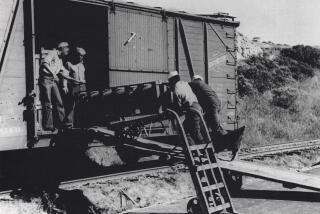Sailors Sue Navy to Block Ouster Over Test for AIDS
Four active-duty and three recently discharged sailors found to have been exposed to AIDS antibodies announced Friday that they are suing the Navy to keep from being “unlawfully discharged” or to be reinstated.
The plaintiffs, four of whom are staying at the Navy Hospital in Balboa Park, went public with the lawsuit after U.S. District Judge Rudi M. Brewster on Wednesday denied a temporary restraining order that would have prevented the Navy from discharging them.
In October, the Navy began testing all of its recruits for the HTLV-III virus. The virus has been associated with acquired immune deficiency syndrome, but testing positively for it does not mean that a person will contract the deadly disease.
The lawsuit is similar to one brought by 13 Navy recruits in Bethesda, Md., who were also found to have antibodies for the AIDS virus in their blood. On Wednesday, those recruits won an extension of a temporary restraining order barring their discharge.
The seven San Diego plaintiffs were tested during boot camp in November and were brought to the Navy Hospital for further testing. When the results were confirmed, the Navy began proceedings to “separate the men from the Navy” based on an “erroneous enlistment” because they had a pre-existing condition that disqualified them from service, said Lt. Gene Elliot, a Naval Hospital spokesman.
The plaintiffs, all of whom are listed as “John Doe” in the suit, contend that the Navy has “failed to establish that the HTLV-III antibody was a pre-existing condition, and are ignoring all of their regulations that pertain to erroneous enlistment,” said one of the seven men, a 23-year-old Californian.
“We’re all healthy,” said another, a 19-year-old Oklahoma man. “They should keep us in.”
The suit also contends that the policy issued by Defense Secretary Caspar W. Weinberger on Oct. 24 “provides that individuals in military service who test positive for exposure to HTLV-III but manifest no evidence of progressive clinical illness or immunological deficiency shall be retained in the service.”
“The Navy should fulfill the contractual agreement with these men and treat them with some dignity,” said Kathleen Gilberd, a paralegal with San Diego attorney Charles T. Bumer, who with attorney Tom Homann is representing the men. All three are members of the National Lawyers Guild Military Task Force, which protects the rights of military personnel and is helping with the lawsuit.
“The way they are discharging them is jeopardizing their future employment as well as stigmatizing them,” Gilberd said.
The four men who remain on active duty are living in a special ward of the Navy Hospital, where all recruits who test positively for the virus are stationed, and perform small chores such as running errands within the hospital while awaiting their fate, Elliot said.
“It isn’t custody. It isn’t confinement,” Elliot said. “We are providing hotel services for the men--food, lodging, a place for them to be--the clinical services and also counseling.
“For the most part they are in limbo.”
Since the Navy began testing, 15 recruits have stayed at the ward, he said. The sailors are given an “administrative separation,” which is neither an honorable nor dishonorable discharge, Elliot said.
“That kind of separation avoids any type of guilt being associated with them,” he said. “It would be as if they never joined the Navy.”
At the news conference Friday, several of the men claimed a breach of confidentiality and said that they have been “harassed and stigmatized” since the test results proved positive.
“I will no longer have the kind of life I had before I joined the Navy,” said another plaintiff, a 25-year-old from Arizona. “For me to be healthy and basically be told, without any compassion or counseling, that I might have a deadly disease . . . .”
The Oklahoma man said that his family has refused to accept him back into their home, and that he is uncertain how he will support himself now that he has been discharged.
“My dad said he’d be standing with a loaded shotgun in the driveway if I come home,” he said.
Despite the difficulties the men say they have experienced in the Navy, all said they wish to remain in the service.
“I enlisted wanting to make a career of the Navy . . . be part of America,” said the Californian.
More to Read
Sign up for Essential California
The most important California stories and recommendations in your inbox every morning.
You may occasionally receive promotional content from the Los Angeles Times.








